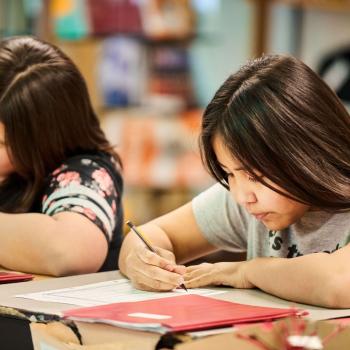This minilesson guides student in using the PQP techniquePraise–Question–Polishto offer concrete and useful peer review feedback.

Peer Review: Narrative

Grades
|
Inside or Outside? A Minilesson on Quotation Marks and More
6 - 8
Lesson Plan
|
Minilesson
Students often question whether a punctuation mark goes inside or outside the quotation marks, especially when writing dialogue. This lesson helps students identify the conventions and apply them to their text.

Grades
|
Character Clash: A Minilesson on Paragraphing and Dialogue
6 - 8
Lesson Plan
|
Minilesson
Students learn about paragraphing conventions in dialogue by revising their own writing.

Grades
|
A Picture's Worth a Thousand Words: From Image to Detailed Narrative
6 - 8
Lesson Plan
|
Standard Lesson
The old cliche, "A picture is worth a thousand words" is put to the test when students write their own narrative interpretations of events shown in an image.

Grades
|
Using Picture Books to Teach Setting Development in Writing Workshop
3 - 5
Lesson Plan
|
Standard Lesson
Students use a graphic organizer to analyze setting development in picture books. They then apply what they have learned to their own writing.

Grades
|
Dr. Seuss's Sound Words: Playing with Phonics and Spelling
K - 2
Lesson Plan
|
Standard Lesson
Boom! Br-r-ring! Cluck! Moo!Everywhere you turn, you find exciting sounds. Students use these sounds to write their own poems based on Dr. Seuss's Mr. Brown Can MOO! Can You?

Grades
|
Using Picture Books to Teach Characterization in Writing Workshop
3 - 5
Lesson Plan
|
Standard Lesson
Students explore character development through experiences with picture books. They learn about the connections between reading and writing and apply the information they learn to revisions of their own writing.

Grades
|
Persuasive Writing: What Can Writing in Family Message Journals Do for Students?
K - 2
Lesson Plan
|
Standard Lesson
This lesson engages children in using writing to their families as a persuasive tool to get what they want and need.

Grades
|
Letter Poems Deliver: Experimenting with Line Breaks in Poetry Writing
3 - 5
Lesson Plan
|
Standard Lesson
Students explore letter poems and experiment with writing letters as poems, using the placement of line breaks to enhance rhythm, sound, meaning, and appearance.

Grades
|
Writing a Flashback and Flash-Forward Story Using Movies and Texts as Models
6 - 8
Lesson Plan
|
Standard Lesson
Using the film The Sandlot, students are introduced to the literary devices of flashbacks and flash-forwards. They then write their own stories using those devices.

Grades
|
How Big Are Martin's Big Words? Thinking Big about the Future
3 - 5
Lesson Plan
|
Minilesson
Inspired by the book Martin's Big Words, students explore information on Dr. King to think about his "big" words, then they write about their own "big" words and dreams.

Grades
|
What Makes Poetry? Exploring Line Breaks
3 - 5
Lesson Plan
|
Minilesson
Students read various poems and explore why lines are broken where they are and how they affect rhythm, sound, meaning, and appearance in poetry.

Grades
|
It Doesn't Have to End That Way: Using Prediction Strategies with Literature
K - 2
Lesson Plan
|
Minilesson
After listening to the beginning of a story, students use details in the text, personal experience, and prior knowledge to predict the way the story will end.

Grades
|
Breaking Barriers, Building Bridges: Critical Discussion of Social Issues
6 - 8
Lesson Plan
|
Standard Lesson
Through a series of picture book read-alouds, students engage in critical discussion of complex issues of race, class, and gender.

Grades
|
Who's Got Mail? Using Literature to Promote Authentic Letter Writing
3 - 5
Lesson Plan
|
Standard Lesson
Students discuss and chart letter elements and write their own letters to adults at school, reinforcing letter-writing skills beyond the classroom lesson.

Grades
|
Growing Readers and Writers with Help from Mother Goose
K
Lesson Plan
|
Recurring Lesson
Watch Mother Goose work her magic! This lesson uses nursery rhymes to help emergent readers remember the letters and their sounds and identify word chunks.

Grades
|
Family Message Journals Teach Many Purposes for Writing
K - 2
Lesson Plan
|
Standard Lesson
This lesson encourages children to explore authentic reasons for writing by writing messages to their family in a family message journal.

Grades
|
Alliteration in Headline Poems
6 - 8
Lesson Plan
|
Minilesson
Students will be introduced to the term alliteration and create a headline poem consisting of 25 words that contain at least three examples of alliteration.

Grades
|
She Did What? Revising for Connotation
6 - 8
Lesson Plan
|
Minilesson
Did she walk, skip, amble, dance? In this minilesson, students explore connotation by acting out and revising the simple sentence "She walked into the room."

Grades
|
Launching Family Message Journals
K - 2
Lesson Plan
|
Standard Lesson
This lesson introduces Family Message Journalsa teacher-tested tool for encouraging family involvement and supporting writing to reflect and to learn.